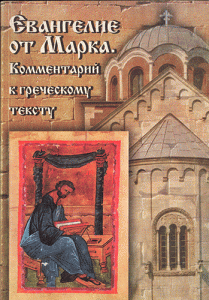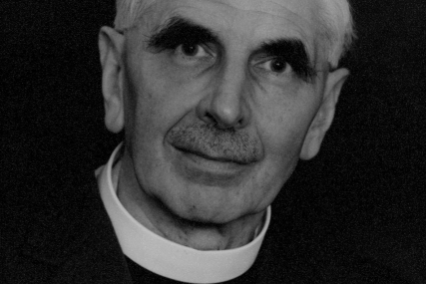 Сегодня, вспомнив об одном из лучших комментариев на Марка, я захотел посмотреть чуть подробнее о его авторе, Чарльзе Крэнфилде.
Сегодня, вспомнив об одном из лучших комментариев на Марка, я захотел посмотреть чуть подробнее о его авторе, Чарльзе Крэнфилде.
И вот какой текст я нашел (ниже).
Читателям же предлагается реферат комментария по изданию: Я.Г.Тестелец. Евангелие от Марка. Комментарий к греческому тексту, и оригинальный комментарий (правда, одно из ранних изданий, реферат выполнен уже по переработанному двухтомному изданию).
by Tom Wright, a former Bishop of Durham, is research professor of New Testament and early Christianity at the University of St Andrews
The Reverend Professor Charles E. B. Cranfield, who has died six months short of what would have been his hundredth birthday, was one of the leading British New Testament scholars of the second half of the twentieth century. He taught in Durham for thirty years, as Lecturer (1950-62), Senior Lecturer (1962-66), Reader (1966-78) and finally in what used to be called a ‘personal chair’ (1978-80). (Throughout much of that time Professor C. K. Barrett, younger by two years, was the ‘Professor of New Testament’; Durham, like most universities then, only had one ‘professor’ in each subject.) Barrett and Cranfield lived close to one another on the western slopes of the city of Durham. They observed an old-fashioned courtesy, but students would sometimes detect a slightly frosty atmosphere between two men who were in some ways so similar and in others so different.
In part this may go back to a decision which Cranfield took early in his time in Durham. After school at Mill Hill in London, Cranfield graduated from Jesus College, Cambridge, and then trained for the Methodist ministry at Wesley House, just down the road. Having been ordained as a Methodist in 1941, he briefly took a pastoral charge at Shoeburyness before serving as a Chaplain to the Forces, working with German prisoners-of-war after the end of hostilities. He then returned to pastoral ministry, this time in Cleethorpes (1946-50), before being appointed to Durham. But at that time his theological convictions took him away from the Methodist Church (of which C. K. Barrett, who had also trained at Wesley House, remained a leading light), and he was admitted to the Presbyterian Church of England (which later became part of the United Reformed Church) in 1954. Since he was not going to serve as a parish minister (though he continued to preach, and wrote many articles and some books for a ‘popular’ audience), this decision can only have been because of a deep theological conviction, taking him in the direction of a solidly Reformed theology and hence away from both the implicit Arminianism and the increasing liberalism of (some) British Methodists. Cranfield had studied briefly in Basel, his research there being cut short by the outbreak of war. He remained a steady though not entirely uncritical Barthian thereafter, sometimes sending his own research students to study with ‘the old man of Basel’ as part of their course.
Cranfield was known in Durham as a patient and thorough, if not exactly scintillating, lecturer. His deep concern to probe to the very heart of the text, and his careful attention to all relevant details, tried the patience of those less studious, and perhaps less saintly, than himself. But there was never any doubt that one was in the presence of a man who cared equally deeply about the actual content and personal meaning of the text and about the importance of exact, clear-thinking scholarship upon it. These are the qualities that shine out of his published work.
His first book was on I Peter (1950), and he followed this with a short commentary on I and II Peter (1960). He published half a dozen other ‘popular’ books, including collections of sermons (If God be For Us, 1985) and essays (The Bible and Christian Life, 1985). But he is best known for two masterpiece commentaries: that on the Gospel according to St Mark (1959, and many subsequent editions) and his two-volume International Critical Commentary on Romans (1975, 1978, and many subsequent impressions). A shorter commentary on Romans followed in 1985; a Vorarbeit of the commentary on chapters 12 and 13 had appeared in 1965. Cranfield had been appointed as the New Testament editor for the new series of the International Critical Commentary, then published by the Scottish house of T & T Clark in Edinburgh, and one surmises both that his embrace of a moderate Reformed stance had endeared him to their board and that his own desire to write on Romans was one of the reasons he took on the onerous task, which he only relinquished in 2005, his ninetieth year, though he had for some time shared the duties with others.
On Mark, and in the editing of the ICC on Matthew (written by W. D. Davies and Dale Allison), Cranfield regularly took what would now be seen as a ‘conservative’ line: though clearly not an inerrantist, he did not usually like to rule out the possibility that Jesus really did say and do more or less what the gospels indicated. There are a few footnotes in Davies and Allison which say, perhaps through clenched teeth, that ‘the editor has asked us to say’ something which the authors had not wanted to say, offering a different, and usually more conservative, point of view. But for many of us, starting gospel study, ‘Cranfield St Mark’ (which always sounded like a parish church in some idyllic rural setting) was the sigh-of-relief alternative to the arid scepticism of D. E. Nineham’s Pelican commentary. Gospel scholarship, and for that matter Historical Jesus scholarship, has moved on a long way since the 1950s. But Cranfield’s patient scholarship was solid, and, though now somewhat of a period piece, the book retains his characteristic combination of reverence for the gospel and its subject-matter and determination to look patiently and carefully at every syllable of the text.
The magisterial two-volume commentary on Romans bears all the marks of a lifetime of thorough and indeed prayerful study. I have written about it in more detail elsewhere (in a Themelios article, now reprinted as chapter 3 of my Pauline Perspectives (2013)). The remarkable thing about this commentary is that, even though I now disagree with Cranfield on several of the major interpretative issues, his steady and persistent laying out and weighing up of all the exegetical options remains a model of ‘how to do it’. You always know, with Cranfield, that if you are going to take a different line you will need to get up very early in the morning and hold your nerve through some highly complex discussions of texts and theological issues. His massive and painstaking scholarship was recognised in a DD from Aberdeen (1980), in being appointed FBA (1982), and in the British Academy’s Burkitt Medal for Biblical Studies (1989).
Cranfield had the misfortune (though I doubt if he saw it like that) to be completing his Romansjust when the ‘Sanders revolution’ was sweeping through Pauline studies, with E. P. Sanders’ Paul and Palestinian Judaism (1977) drawing together many earlier protests against a basically Lutheran reading of Paul, and generating the so-called ‘new perspective’ in which I and others have been heavily implicated. However, the ‘new perspective’ (which actually should be plural, because there is no single ‘school’ of that name) was, at one level, basically a retrieval of a Reformed emphasis on the goodness and God-givenness of Israel and the Torah, as opposed to what Cranfield himself saw as the semi-Marcionite understanding of many Germans, as also of his colleague Barrett. There are thus convergences between him and the ‘new perspective’ which transcend any easy opposition. Nevertheless, to take two obvious examples, Cranfield argued stoutly for the Reformational reading of dikaiosynē theou, not as God’s own ‘righteousness’ but as the ‘righteousness’ which comes as a gift from God through the gospel; and for taking Romans 7.7-25 as a description of the ‘normal Christian life’. Both of these are now decidedly minority positions. He proposed an understanding of Romans 9—11 which he himself saw as leaning heavily on Barth’s Church Dogmatics, and which some have seen as considerably distorting what Paul was actually saying.
My own personal gratitude to Cranfield dates to one evening in the early 1970s when I had been reading other writers on ‘Paul and the Law’, and had found myself increasingly uncomfortable with the idea, popular at the time, that Paul had seen the Mosaic Law as a bad thing now happily abolished through the gospel. (This went, of course, with the liberalism of the 1960s and 1970s, when moral restraint was being cast off as stuffy and old-fashioned.) Though I do not think Paul’s discussion of the Jewish Law was primarily about moral restraint, this easy-going rejection of the law, and a facile opposition between ‘law’ and ‘gospel’, was the order of the day, and I was having difficulty combatting it. At that point I came across Cranfield’s essay on ‘Paul and the Law’, published earlier, and then subsequently incorporated into the long essay on Pauline theology at the end of the second volume of the Romans commentary. I think that was the first time I ever spontaneously knelt down and thanked God for an academic article. It said what needed to be said at a time when nobody else was saying it.
I corresponded briefly with Cranfield, both after his Romans commentary and after my own book The Climax of the Covenant (1992), which was clearly taking a very different line to him on several issues but with which he was determined to wrestle. We met only occasionally – including one memorable conference in Durham at which almost everybody who had written on Paul and the Law in the previous twenty years was present, with the notable exception of Ed Sanders! – and he was always gracious, courteous and thoughtful. Though I did not see his pastoral or churchly side in action, the word among people in Durham was that he hated ecclesial pomp and ceremony, including the wearing of academic hoods in church; that he went regularly and voluntarily to Durham Prison early in the morning to meet men being discharged and to take them for a cup of tea and see if he could be of any practical help; and that he went out of his way to be kind and helpful to his students. (Barth, of course, had been a regular visitor and indeed preacher at the prison in Basel; no doubt Cranfield, acting out of his own pastoral instincts and concerns, was aware of that example.) On one memorable afternoon, during a conference in Durham, I went to a meeting in the Cranfield home, and found myself sipping tea between the great man and C. K. Barrett. I felt like a small puppy sitting between an elephant and a rhinoceros. These were men who, for all their differences, showed the next generation what it looked like to hold together massive scholarship and deep personal faith and commitment. Barrett died in 2011, and his praise has been sung. Now, we thank God for the patient faithfulness, the gentle wisdom, the ferociously precise scholarship, and the pastoral heart of Charles Cranfield. May he rest in peace and rise in glory.
Источник: https://www.fulcrum-anglican.org.uk/articles/the-reverend-professor-charles-e-b-cranfield-1915-2015/
Более полная версия Дж. Данна доступна в приложении.






